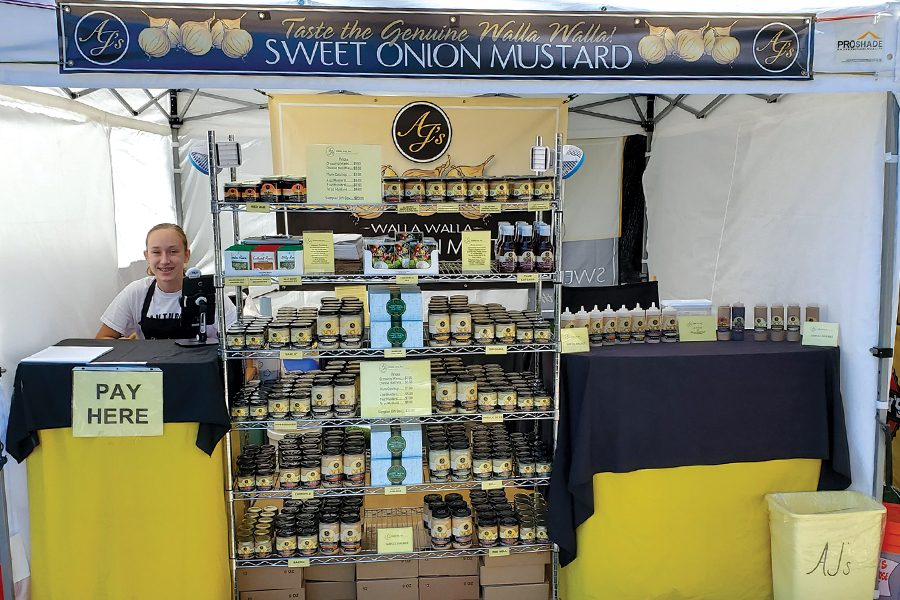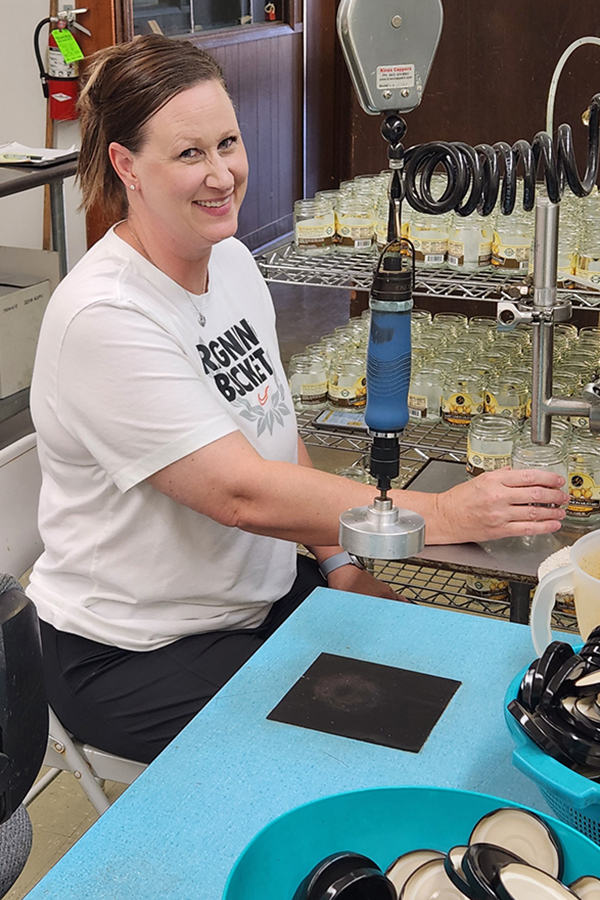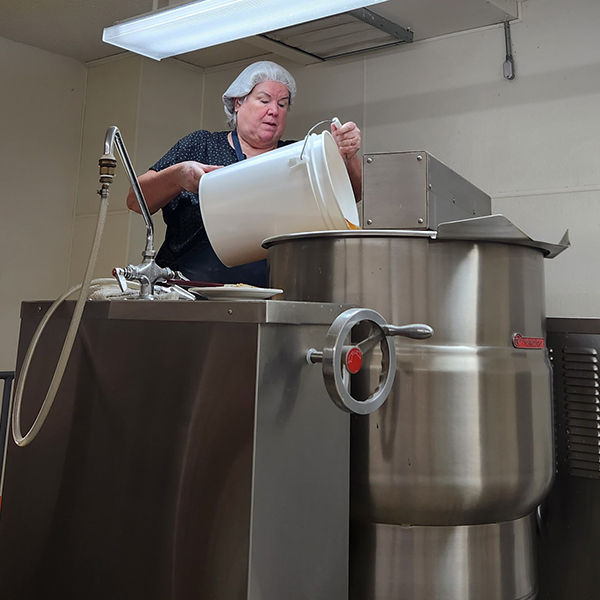
Home » Pasco-based business still manufactures local mustards by hand
Pasco-based business still manufactures local mustards by hand

June 13, 2023
A small shop in Pasco pumps out tens of thousands of jars of mustard annually, all made by hand with recipes created in the 1980s by Alice Jones, now 90.
The business is now run by Jones’ daughter, Juli Massingale, yet still bears her mom’s initials, AJ’s Edible Arts.
Jones used to cater out of private kitchens, making her own sauces like mustard and ranch dressing. Clients and partygoers often asked where they could buy the sauces, and so she decided to bottle them herself. The first jars were sold at the original Country Mercantile store north of Pasco when it was just a fruit stand.
“We’ve been there since before they were there,” Massingale said.
AJ’s bottles its products at 313 S. Fourth Ave. in Pasco.
Jones was still at the helm until just a few years ago when the family had to “force” her into retirement from the labor-intensive mustard-making business she launched 34 years ago in 1989.
Labor-intensive work
The operation begins with 50-pound bags of Walla Walla sweet onions bought only during the yearly harvest and all trimmed by hand.
Last year, Massingale purchased onions three different times so they didn’t go to rot and cut all 2,000 pounds herself.
“I thought, you know, if I can do this slow enough, which I do, because I’m 67 and the ol’ hands and back aren’t what they used to be, and it took me three weekends,” she said.
She will contract additional help for the years she buys more, like in 2019 when she bought 10,000 pounds of onions from a single harvest, which usually runs from the end of June through mid-August.

“We’re the only value-added product that uses genuine Walla Wallas because nobody likes to mess with them,” Massingale said.
The hand-trimmed onions go into a commercial meat grinder which results in a five-gallon bucket of onions frozen for future use.
“We stay two years ahead of ourselves,” Massingale said. “I just finished using 2020 onions a couple weeks ago, so I still have 2021 and 2022 because we do not use other onions, only Walla Wallas, and if we run out of onions, we’re basically screwed until the next year.”
Year-round operation
Mustard-making takes place year-round, using a three-hour process that produces nearly 300 jars, typically about 9 ounces each.
“We went from a little pot on the stove to a bigger pot on the stove to a bigger stove with a bigger pot and now we have a steam jacketed 40-gallon kettle,” Massingale said.
Using a self-stirrer to blend the mixture along with other herbs and spices allows Massingale to walk away and take care of other duties.
“I’m also the floor mopper, the shipping department and my husband is our maintenance man,” she laughed.
The company uses a machine that hooks up to the kettle to fill one jar at a time, “then we put the labels on and kick them out the door,” Massingale said.
The family can push out up to three batches in a single day, but it’s hard work.
Since they’re also jarring it themselves, they usually stick to one batch a day, start to finish. In a year’s time, they produce about 80,000 to 90,000 jars of all sizes.
The average retail price for the most popular mustard size is about $8 for a 9-ounce jar.
“We have a jar shaped like an onion that the retailers are kind of backing off because of the price of it. It’s more labor intensive and that jar costs more, and holds almost 8 ounces, but it costs more, so they make more money on the 9-ounce jar,” Massingale said.
Longtime customers
One of AJ’s biggest customers is the Made in Washington brand, which opened in 1984 and has a few retail locations on the west side of the state, including SeaTac International Airport, as well as an online presence. The jarred mustards are used in their gift packs.
“We’ve been there for over 30 years,” Massingale said.
While the original flavor is the biggest seller, the company makes many other varieties.
In her opinion, the least popular flavors are actually the best ones: bell pepper and chipotle. “Bell pepper is my favorite, and I don’t even like bell peppers,” she said.
Other options include garlic, whole seed, bacon, dill and horseradish.
“Eight-flavors fit in our gift box,” which has been the standard offering for a while. “To change, we’d have to quit making something to bring in something new, and it’s not broke, so we haven’t fixed it in quite a few years,” Massingale said.
The mustards also can be found at the large fruit stands off Interstate 90 near Ellensburg and Thorp.
“They found that the value-added products encouraged shoppers to come year-round,” Massingale said. Other unique locations using the products include the National Mustard Museum in Middleton, Wisconsin. That’s where Massingale thinks someone associated with The Stirling Hotel in New Jersey must have been introduced to the family’s mustard line because the hotel’s restaurant buys it by the gallon to serve with pretzels.
“The freight is terribly expensive, but they still want it,” she said.
The day Massingale met for an interview, she had made a batch of AJ’s Plum Catchup, also sold by the gallon to a restaurant located off the tasting room of Trailbreaker Cider in Liberty Lake near Spokane. “It’s one of the things I can make all day and still go home and eat it,” she said.

To make the plum ketchup, the fruit is frozen raw, pressure cooked and then run through a food mill. Massingale said Trailbreaker buys about 12 gallons every few months.
“When we show up in Spokane, people are looking for it because nobody carries it in their store,” she said.
Where to find locally
Their whole seed mustard is also used at a brewery in Wenatchee, and the company partners with Ice Harbor Brewery in Kennewick to create its red ale mustard.
Locally, AJ’s mustards, mixes and dressings can be found at Country Mercantile stores in Richland and north of Pasco. They also are served on sandwiches in the stores’ delis.
The condiments were recently added to the menu at the new Moonshot Brewing location near Howard Amon Park in Richland for use with its Scotch eggs.
The AJ’s brand has been around long enough that they don’t have to sell at farmers markets, but they do tend to staff a booth at events like the Custer’s Arts & Crafts Shows.
“My daughter does most of the sampling and the granddaughter handles the money,” she said.
Already tapping the second generation, the plan is to keep the business within the family when Massingale retires.
“I hope that someone can grow it to where it makes money; business has dropped off in the last probably 10 years because we don’t do enough marketing,” she said.
AJ’s still ships weekly to retail customers all over the United States, often through the Made in Washington partnership.
AJ’s Edible Arts: 313 S. Fourth Ave. in Pasco, ajsediblearts.com, @ajsediblearts.
Local News Manufacturing
KEYWORDS june 2023




